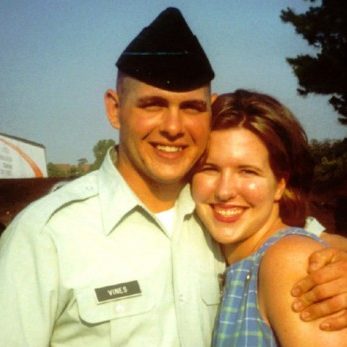I was incredibly excited when the folks here at Soldiers asked me to write a post for caregivers. Of course I’m honored to be “here” (as a proud former Army wife, it’s sort of a big deal!), but honestly, I was even more excited because it’s yet another indication that we (those caring for heroes who have served our country) are starting to actually be “seen.” People are noticing us, what we do, what we face. And they’re trying to help us DO all of it better.
I’ll be honest about something else too. Deciding what I would have wanted to know in 2007 when I started this life, when I began my now often 24×7 “job” as a caregiver to my hero hubby, has been a challenge. There’s a lot to know. And each of us, while our stories are similar, has a very different experience on this path.
So, I asked the smartest people I know (and some of the people I love most in the world). I asked a few hundred caregivers. I asked the people who have become a second family while walking through and working in this life beside me. They are also most definitely the only experts I know on this topic.
Here’s what we came up with: Our very own top ten list, the stuff we hope will help you find your way a little easier if you’re just joining our ranks or, if you’ve been here for a while and are still struggling – like most of us – to work out all of the kinks. It’s a mixture of stuff we hope will save you time, a precious commodity in our world.
1. Find people near you who can help and are willing to understand (or at least pretend they do).
Our families have a lot of emergencies, unexpected events, times of high stress and times where you know as a caregiver you need to say “uncle.” With post-traumatic stress disorder and traumatic brain injuries as the hallmark injuries of the recent wars, it becomes very easy for not only a hero to isolate, but for the whole household to slowly do the same.
Do your best to resist. Know that you need people who are available (and preferably within a reasonable driving distance) to help sometimes. Know that there will be times – more often than many of us like – that you will need that support and just plain boring help with logistics. It will make a huge difference in your own mental health and stamina. I promise.
2. Find a network of caregivers and use it.
You will need people who “get” your life. You’ll need them on bad days and you’ll enjoy celebrating with them on the good ones. You will run into questions that you never imagined, scenarios you couldn’t possibly plan for, but almost 100 percent of the time, another caregiver has been there and done that.
You will also find that those caregivers will not only become a practical, what-the-heck-do-I-do-now source of help, they will also become some of your closest friends. This life can be lonely and at times very sad, but having people who truly understand to help you face it and talk it through will help when few other things do.
Thanks to technology, there are many groups on the Internet and social media sites. Many veterans’ hospitals and military installations also have support groups or are in the process of starting them. Find them. Seriously, you’ll need them.
3. Allow yourself to grieve, but also look for the “good” stuff.
Whether facing invisible injuries like PTSD and/or TBI, or physical injuries or illness, one of the things people don’t like to talk about a lot is the fact that we caregivers have to grieve and process “what might have been.” Your hero may have a therapist or physician tell them it’s “normal” to struggle with the changes they’re facing, but few people (unless you have a great counselor for yourself) will tell you that you need to do the same.
It’s a painful process, one you may revisit sometimes as you walk through this life, but allowing yourself to grieve hopes, dreams and plans that have changed will help you make room in your heart for your new life and its hopes, dreams and plans.
It can also, slowly but surely, help you see the “good” stuff, the stuff that would have never happened in your “other” life. It gives you room to recognize things about your relationship (deeper connections, more open discussions about feelings or needs, more honest talk about challenges) and yourself (clearer priorities, newfound strength, more confidence) that are actually new and improved, even among all of the challenges.
4. Remember you count, too.
You will find yourself very often caught up in caregiving around the clock. Medications, appointments, managing symptoms, helping with “simple” tasks, tracking schedules, etc., can completely take over until you begin to lose yourself.
Decide from the start to DO something regularly for you. Something you enjoy, something that inspires you, something that comforts you because you need that, and your needs (and heart and health) count too.
5. Know you may struggle with when exactly you’re a caregiver and when you’re still a spouse or a parent.
One of the most challenging parts of this life is that your personal relationship with your hero – the normal stuff that doesn’t involve injury or illness – and your job as a caregiver can become one gigantic gray area. It becomes hard to know when you are helping and when you are doing too much. It can be confusing to figure out when to be in charge and when to step back. (And, truthfully, those lines often change from day to day or minute to minute.)
There’s no real right answer to this puzzle. You need to trust yourself and your instincts. And you will also find that it’s really helpful to keep a conversation going with your Soldier about how each of you see things. (Yes, I get it. Sometimes that’s easier said than done.) Is he or she feeling overrun or supported? Are you feeling taken advantage of or like you’re doing the best job you can? Try your best to take the team approach whenever possible and keep each of you involved with figuring out those gray areas.
Also, know that there are just going to be times when one or both of you completely screw up along the way. Mistakes happen, more often in our worlds, and you’ll figure it out a little better next time, so no worries.)
6. Find a way to talk openly (and honestly) about sex.
There are a lot of injuries, illnesses and struggles (and many parts of caregiving) that impact our sex lives. You and your veteran may go through periods of no sex (or way more sex than before). You may find it hard to switch from being in “caregiver mode” to suddenly being ready for “bed.” One or both of you may be physically tired or emotionally spent or both on a regular basis. A Soldier’s sex drive may change. Your sex drive may change. Because of an injury, your hero may find it feels awkward to be intimate. There’s just (again, being honest) a lot of stuff to deal with and sometimes sex gets bumped far, far down the priority list.
My best advice here is to talk. It may feel odd for the first few times if, prior to your veteran’s deployment, it (talking openly about your sex life) wasn’t something that you normally did. But, those conversations can help a lot. Talk about concerns, fears, mechanics, ideas, fantasies, expectations and hopes. Be honest. Be as direct as possible. And always take each other’s feelings (and egos) into consideration. And again, the more you talk, the easier it will get, so just do.
7. Talk to your children. Tell them the truth. And tell them it’s OK that your family may “look” different.
Many of our families have young children. Our kiddos have a lot of questions (and fears), especially when Mom or Dad comes home from a deployment “different” and suddenly there are a lot of new words and medical equipment and doctors and whispered discussions. The explanations they come up with in their own heads are often far worse than reality, and the longer you wait, the harder it is to help them get settled into life as part of a family facing the costs of service.
You will of course want to talk to your children at age appropriate levels, but do start talking. Be honest (within reason). Encourage them to talk about their worries and ask questions when they need to. Talk about how they feel, about how to handle and talk to others about their roles in your “new” family. Setting the stage for that kind of communication from the very start makes things so much easier as time goes on.
8. Set up a filing system that can grow.
You may have thousands (literally) of pieces of paper to keep up with. Develop a “stuff to keep very close on hand” and a “what we do with medical records we may need or might never need but certainly can’t get rid of” strategy that works for you.
And, that DD214 you get after retirement or separation, it does everything post service. Have lots of copies. Store them in multiple safe locations. Know where they are because it never fails that a “need it now” emergency arrives the moment you can’t find a copy.
9. Learn to keep lots of lists.
A lot of them. Seriously. Lots of lists. You will have days when your brain takes a vacation at the worst possible time, nights of little sleep and often the doctor or nurse you’ve been trying to reach for days will call just perfectly at the time when your world has fallen into complete chaos and you can’t remember why you wanted to talk to him or her.
Yes, believe me, lists are important.
10. Ask questions. Then re-ask. Then ask again.
You may find yourself fighting uphill battles related to medical care or benefits from time to time. Many things have improved in the last few years, but we still have a long way to go. One of the major caregiver tricks is knowing that the people who seem like they know the answers (and may even give you answers they believe are 100 percent accurate) may or may not be right.
It’s okay to ask and to keep asking until you’re positive that you’ve received the correct information. You, after all, are a caregiver. I’m sure it’s listed somewhere in our job description.
One final piece of advice
Be kind to you, know you’ll make mistakes and know that you know your hero and family best, and that doing the best you can at any given moment is all that anyone (including you) can expect.
Brannan Vines is the proud wife of an Operation Iraqi Freedom veteran, a caregiver and founder of FamilyOfaVet.com, an organization dedicated to helping servicemembers, veterans and families navigate life after combat.
Click here to read this story in its entirety.












Follow Us